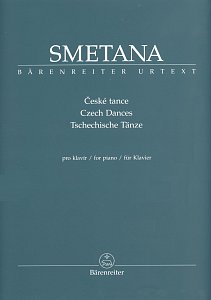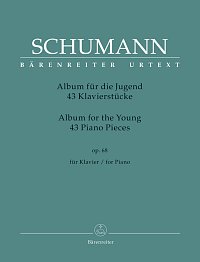SMETANA: Czech Dances (urtext) / solo piano
| Publisher | Barenreiter |
| Genre: | classical & sacret |
| Arrangement: | piano |
| Cast: | solo |
| Difficulty: | Advanced |
| Format: | book - paperback |
| Series: |
Czech composer
Barenreiter Urtext |
Parameters
| Product code: | BA9507 |
| Composer: | Smetana, Bedřich |
| Author / Editor: | Novotný, Jan |
| No. of songs: | 14 |
| Pages: | 94 |
| Language: |
English
German Czech |
| Size: | 24 x 31 cm |
| EAN: | 9790260103825 |
| ISMN: | M-006-53376-3 |
| Weight: | 398 g |
Songlist (14)
- Polka fis moll
- Polka a moll
- Polka F dur
- Polka B dur
- Furiant
- Slepička
- Oves
- Medvěd
- Cibulička
- Dupák
- Hulán
- Obkročák
- Sousedská
- Skočná
Product description
“Czech Dances for Piano” are the last cycle, and at the same time, the high point in Bedrich Smetana’s works for piano. The impetus for the composition of this work for Smetana was probably the first series of “Slavonic Dances” by Antonin Dvorak.
The volume contains the four polkas composed in 1877, with which Smetana completed his stylisation of the polka in masterly fashion, together with ten folk dances from 1879, with titles such as “ Furiant ”, “ Slepicka ” (Little Chicken), “ Oves ” (Oats), “ Medved ” (Bear), “ Cibulicka ” (Little Onion), “ Dupak ”, “ Hulan ” (Ulan), “ Obkrocak ” (Callipers), “ Sousedska ”, “ Skocna ” (Spring Dance).
Behind these names are diverse, richly varied types of exuberant youths’ and lyrical girls’ dances. The cycle culminates in two group dances. The new edition of the work includes an editorial commentary by the pianist Jan Novotny.
Bedřich Smetana (1824 - 1884) was a Czech composer of the Romantic period. He is one of the most famous Czech composers. From his early youth he was devoted to music, especially piano playing and composition. During his lifetime he worked as a concert pianist, music teacher, conductor and music critic. Smetana wrote mainly operatic and symphonic works. His piano works, concentrated in the early stages of his compositional activity, also occupy a considerable volume in his oeuvre. His chamber music is represented by rare, though substantial, works, and his choruses and songs occupy a rather marginal position. At the age of fifty he became completely deaf, but even after his hearing loss he was able to compose a number of masterpieces. Throughout his work he strove to create a distinctive Czech musical style.








